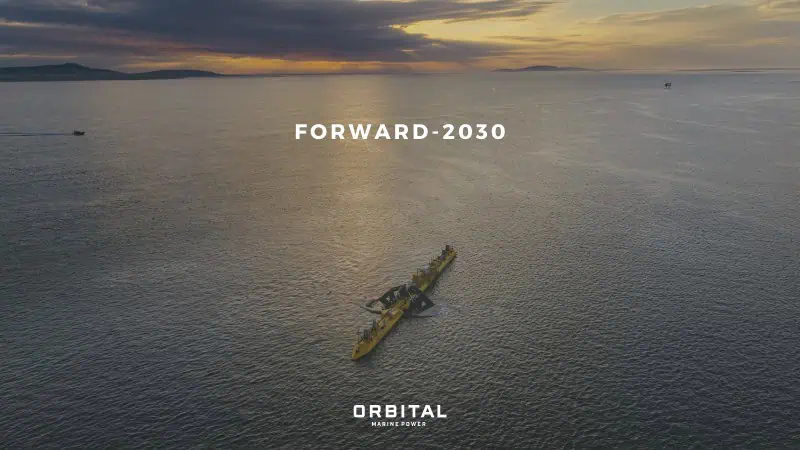The innovative Scottish technology developer, Orbital Marine Power (Orbital) will lead a pan-European consortium to deliver the €26.7m FORWARD-2030 project, set up to accelerate the commercial deployment of floating tidal energy.
The FORWARD-2030 project consortium will receive €20.5m of grant support from the European Union’s Horizon 2020 research and innovation programme to develop a multi-vector energy system for the future. This system will combine predictable floating tidal energy, wind generation, grid export, battery storage and green hydrogen production.
The project will see the installation of the next iteration of the Orbital turbine, integrated with a hydrogen production facility and battery storage at the European Marine Energy Centre (EMEC) in Orkney. Project partners will design options for integrating large scale tidal power into future net zero energy systems, whilst developing environmental monitoring and marine spatial planning tools for large floating tidal arrays.
Orbital will act as project coordinator as well as lead technology developer for the FORWARD-2030 project.
During the project, Orbital will advance the company’s pioneering floating tidal turbine design, with support from technical partner SKF, who will design and build an optimised fully integrated power train solution, designed for volume manufacture. The partners will deliver several technical innovations targeting increased rated power, enhanced turbine performance and array integration solutions. These innovations will reduce the cost of Orbital’s sector-leading technology even further.
The next generation turbine will be deployed at EMEC’s Fall of Warness tidal test site off Eday in Orkney, where the company has already installed the O2, the world’s most powerful floating turbine, this summer. Once installed next to the O2, the new turbine will be part of the world’s most powerful floating tidal array.
EMEC will host the demonstration, facilitate hydrogen production, deliver a comprehensive environmental monitoring programme, and develop a live environmental monitoring system and test programme.
LABORELEC will assess large scale integration of tidal energy to the European energy system, develop a smart energy management system and an operational forecasting tool. The University of Edinburgh will deliver techno-economic analysis of tidal energy, and the MaREI Centre at University College Cork will be responsible for addressing marine spatial planning issues for wide scale uptake of tidal energy.
Commenting on the award, Oliver Wragg, Orbital’s Commercial Director said:
“This endorsement of the Orbital technology by the European Commission is a huge vote of confidence in our capability to deliver commercially viable tidal energy. We now have a focused and highly experienced consortium dedicated to the delivery of tidal energy and committed to accelerating its future uptake. This alignment of interest sets FORWARD-2030 on course to have a meaningful impact as we build towards large scale commercially viable tidal energy projects.
“Orbital has consistently delivered step changes in cost reduction for the tidal energy sector and the FORWARD-2030 project will enable us to take that next step.”
Michaël Marique, CEO of Ocean Energy Europe:
“The integration within a single system of tidal and wind energies, as well as storage by batteries and hydrogen makes FORWARD 2030 a world first. ENGIE Laborelec is proud to participate in this large-scale project, which should make it possible to take a decisive step towards integration of multi-renewable technologies projects with large mixed storage.”
Michael Baumann, Business Development Manager, Marine and Ocean Energy at SKF said:
“We are enthused and excited about the opportunities presented by the funding from the European Commission for this project. We are proud to be part of this exciting journey with Orbital, developing technology and providing integrated power train solutions for environmentally friendly tidal power. FORWARD 2030 will be a great steppingstone in demonstrating commercial and technical competitiveness of tidal energy and is ultimately set out to provide technology readiness for serial production.”
Matthijs Soede, Senior Policy Officer at European Commission DG Research and Innovation said:
“The FORWARD-2030 project has the potential to accelerate the commercial deployment of tidal energy, whilst firming up Europe’s position as a leader in tidal energy, this fits perfectly with our aim to realise the Green Deal. The FORWARD-2030 consortium shows a great ambition in tidal energy development itself, by clearly putting the large scale development of the tidal energy market for 2030 in mind. Its success will be a milestone for the ocean energy sector and will support the clean energy transition in the long-term.”
Commenting on the award, Remi Gruet, CEO of Ocean Energy Europe, said:
“FORWARD 2030 showcases the extraordinary value of continued EU-UK collaboration in ocean energy. This pan-European team saw off stiff competition and will now deliver the world’s first floating tidal farm – an important win for the entire sector.
“With UK participation in Horizon Europe now confirmed, I’m looking forward to even more winning partnerships over the next seven years.”
Rob Flynn, Commercial Manager of EMEC said:
“FORWARD-2030 will show what the energy system of the future looks like by combining offshore renewable generation, with onshore wind and EMEC’s onshore hydrogen and storage facilities – all done in the novel context of an island grid. The project represents a major step forward for the commercialisation of tidal energy and we are delighted it has received this significant stamp of approval from the European Commission.”
The Fast-tracking Offshore Renewable energy With Advanced Research to Deploy 2030MW of tidal energy before 2030 (FORWARD-2030) project will run from 2021 to 2025.
In addition to the partnership, two project developers and two utilities have committed to join the project Advisory Board. Between the Advisory Board and Consortium members, 2030MW of tidal energy sites have already been identified and are under various stages of development.
This project has received funding from the European Union’s Horizon 2020 research and innovation programme under grant agreement No 101037125.












